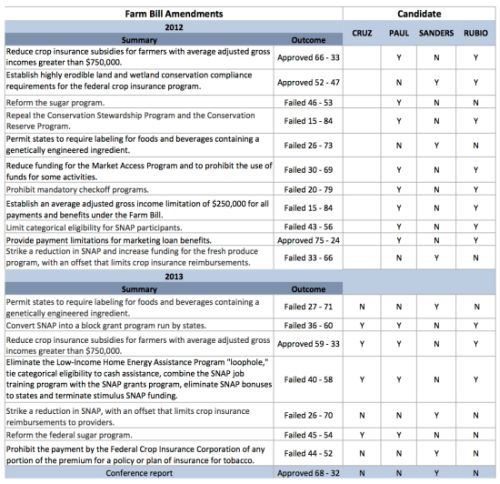WASHINGTON, Jan. 20, 2016 - The Senate farm bill debates in 2012 and 2013 provide several clues as to how some of the major presidential candidates view issues such as crop insurance, conservation and biotechnology.
Republicans Rand Paul of Kentucky and Marco Rubio of Florida as well as Ted Cruz of Texas, who arrived in the Senate in 2013, took stances likely to appeal to the party’s conservative base but repeatedly were out of step with many farm groups and leaders of the Senate Agriculture Committee.
Rubio and Paul voted in both 2012 and 2013 to impose a means test on crop insurance premium subsidies. Cruz voted for the amendment in 2013. The amendment was approved both years.
Rubio and Paul voted in 2012 to repeal the Conservation Reserve Program, which pays landowners to idle environmentally sensitive acreage, and the Conservation
Stewardship Program, which pays farmers for soil and water conservation practices. The amendment failed, 15-84.
Vermont Sen. Bernie Sanders’ votes are harder to categorize. Sanders, who is running for the Democratic presidential nomination, voted against the crop insurance means test, a provision that would have cut premium subsidies for larger farmers with adjusted gross incomes exceeding $750,000. The average farm size in Vermont is only 171 acres, according to the 2012 Ag Census.
Sanders instead supported an alternative amendment, offered by John Thune, R-S.D., in 2012, that supporters of the AGI test considered a poison pill. Rubio and Paul voted against it.
But Sanders also supported an amendment in 2013 that would have slashed payments to crop insurance providers in order to restore cuts to the Supplemental Nutrition Assistance Program. And he voted for an amendment, opposed by the three Republicans, that would have barred premium subsidies for policies covering tobacco.
Where Sanders most made his presence felt was on biotechnology. He twice forced a debate on an amendment intended to guarantee that states, including Vermont, could require labeling of foods with genetically engineered ingredients. “All over this country increasingly people are concerned about the quality of the food they are ingesting and the food they feed their children,” he argued. Sanders lost badly both years.
The Senate debated a farm bill two
years in a row, because the House failed to take up the legislation before the
113th Congress ended in 2012. There were far fewer votes on amendments,
however, the second time around in 2013. Agri-Pulse
examined 38 roll call votes that took place on amendments to the bill in 2012
and 11 more in 2013.
There were 304 amendments filed to the Senate bill in 2012 and 259 more in 2013 but the vast majority didn’t receive votes, or in some cases were accepted by voice vote. The Senate approved the final version of the legislation, 68-32, in February 2014. Sanders was the only one of the candidates to vote for it. Among the other amendments considered over the two years:
· Rubio and Sanders voted in 2012 to make conservation compliance a requirement for crop insurance, a provision that was added to the bill in committee in 2013. Paul voted against the amendment.
· Rubio and Paul supported – but Sanders opposed – an amendment in 2012 that then-Sen. Tom Coburn, R-Okla., said was needed to ensure that people with incomes exceeding $1 million couldn’t receive conservation program benefits. The measure was approved.
· Rubio and Sanders opposed unsuccessful amendments in 2012 and 2013 that would have rolled back the sugar program, an important issue for growers in Rubio’s home state of Florida.
· Rubio and Paul supported an amendment that would have barred farm program payments to individuals with AGIs over $250,000 a year. Sanders voted against the limit, which failed 15-84.
· Rubio and Paul voted for a 2012 amendment that would have banned mandatory farmer-funded checkoff programs. Sanders opposed the amendment, which was sponsored by then-Sen. Jim DeMint, now the president of the Heritage Foundation, which has been sharply critical of farm programs.
· The Republican senators consistently voted to expand the bill’s cuts to the Supplemental Nutrition Assistance Program and to preserve the reductions that were in the legislation. A 2013 amendment that all three Republicans supported, would have turned SNAP over to the states to run.
Ray Gaesser, a former president of the American Soybean Association who farms in southwest Iowa, backs Rubio. He attributes the senator’s votes for restrictions on crop insurance and repeal of the conservation programs to the wishes of his Florida constituents.
“I believe that he is a person who will listen to U.S. agriculture issues and make decisions for the country as a whole,” said Gaesser. He said he talked with Rubio briefly during a recent stop in Council Bluffs, Iowa, and impressed on him the importance of crop insurance.
The positions that Cruz and Paul took on the farm bill were generally in line with their more libertarian approach to economic issues. During an interview last fall Cruz said that crop insurance should be reformed to target smaller-scale operations.
Sanders is an outspoken proponent of GMO labeling and a critic of conventional agriculture. “Overall, we’ve got to put a greater emphasis on family-based agriculture,” he said at a recent campaign event. “To the degree that organic is possible, let’s move in that direction.”
A full list of the amendments and how the four senators voted is here.
#30
For more news, go to: www.Agri-Pulse.com

